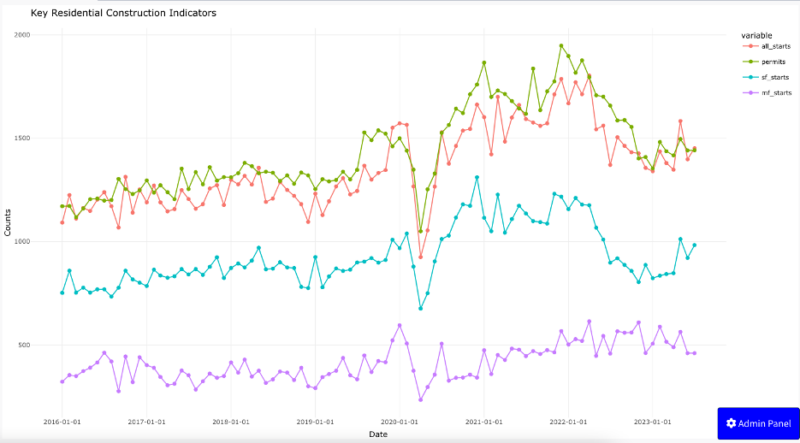Canadian Auto Industry Faces Job Losses: Posthaste Impact Of Trump's Trade Policies

Table of Contents
The USMCA and its Impact on Canadian Auto Manufacturing
The renegotiation of NAFTA into the United States-Mexico-Canada Agreement (USMCA) significantly altered the landscape for Canadian auto manufacturing. While presented as an improvement, the changes introduced challenges for Canadian access to the lucrative US market, a crucial element for the health of the Canadian automotive industry.
-
Changes from NAFTA to USMCA: NAFTA's comparatively open framework for automotive parts trade was tightened under USMCA. New rules of origin, requiring a higher percentage of North American content in vehicles to qualify for tariff-free trade, placed additional burdens on Canadian manufacturers. This impacted Canadian automotive production, as plants had to retool and adjust to the new standards, leading to temporary disruptions and increased costs.
-
Impact on Canadian Automotive Parts Manufacturers: Many Canadian companies specializing in automotive parts faced increased scrutiny under the stricter rules of origin. Meeting the new requirements proved costly and time-consuming for some, leading to reduced competitiveness and, in some cases, plant closures. Smaller businesses, particularly, struggled to adapt, leading to job losses and economic hardship.
-
Increased Costs of Automotive Parts: Tariffs and non-tariff barriers introduced under USMCA increased the cost of automotive parts, impacting both production costs and the final price of vehicles. This reduced the competitiveness of Canadian-made vehicles in both domestic and international markets. The ripple effect impacted the entire supply chain, stretching from raw materials to finished vehicles.
-
Supply Chain Disruptions: The interconnected nature of the North American automotive industry meant that changes in one area had cascading effects across the entire supply chain. The USMCA's adjustments created uncertainties and delays, disrupting the carefully orchestrated flow of parts between Canadian, US, and Mexican auto manufacturers, leading to production bottlenecks and lost revenue.
-
Quantifiable Job Losses: Specific Canadian automotive plants experienced significant job losses following the implementation of USMCA. While precise figures vary depending on the source and the timing of data collection, reports from various sources consistently point to substantial reductions in employment within the Canadian automotive sector.
Increased Tariffs and Their Devastating Effects
The imposition of tariffs on Canadian automotive exports to the US directly increased the costs for consumers and significantly reduced the competitiveness of Canadian-made vehicles. These trade barriers had a profound impact on the Canadian auto industry and its workers.
-
Increased Costs and Reduced Competitiveness: Tariffs added directly to the price of vehicles, making them less attractive to American buyers compared to domestically produced vehicles or those from other countries with more favourable trade agreements. This led to decreased demand for Canadian-made vehicles, resulting in reduced production and job losses.
-
Impact on Specific Vehicles and Parts: The impact of tariffs varied depending on the type of vehicle or part manufactured in Canada. Certain segments, particularly those with a higher reliance on US exports, were more severely affected, leading to disproportionate job losses in specific regions and manufacturing facilities.
-
Reduced Production and Layoffs: Faced with increased costs and decreased demand, several Canadian manufacturers were forced to curtail production or, in more extreme cases, lay off workers. These decisions had a devastating impact on families and communities relying on automotive manufacturing for their livelihoods.
-
Retaliatory Tariffs: Canada responded to the US tariffs by imposing retaliatory tariffs on certain US goods. While this served as a political statement, it did not alleviate the negative consequences faced by the Canadian automotive sector. The retaliatory measures simply further complicated the overall trade relationship.
The Shift in Investment and its Consequences
The uncertainty created by Trump's unpredictable trade policies significantly discouraged foreign investment in the Canadian auto sector. This lack of investment had dire consequences for the industry and its workers.
-
Decreased Foreign Investment: The instability and uncertainty surrounding US trade policies led many international automotive companies to hesitate or postpone investments in Canadian manufacturing facilities. This lack of capital hindered modernization efforts, hampered growth, and contributed to the decline of the sector.
-
Plant Closures and Downsizing: The absence of new investment, combined with decreased demand and rising costs, resulted in the closure or downsizing of several automotive plants across Canada. These closures led to widespread job losses, particularly impacting communities heavily reliant on the automotive industry.
-
Regional Disparities: The impact of job losses was not evenly distributed across Canada. Specific regions, which traditionally housed major automotive manufacturing facilities, experienced a disproportionately severe economic downturn, leading to social and economic challenges.
-
Long-Term Economic Consequences: The long-term consequences for communities heavily reliant on the automotive industry are significant. Job losses, reduced tax revenue, and decreased economic activity all contributed to a decline in the overall well-being of these communities.
Long-Term Challenges for the Canadian Auto Industry's Recovery
Recovering from the setbacks inflicted by Trump's trade policies presents significant long-term challenges for the Canadian auto industry. Regaining previous levels of production and employment requires a multifaceted approach.
-
Challenges in Regaining Previous Levels: The road to recovery is lengthy and arduous. Regaining lost market share, rebuilding damaged supply chains, and attracting new investment will require sustained effort and strategic planning.
-
Need for Industry Diversification: Reducing reliance on the US market is crucial for future stability. Diversification into other sectors, exploring new technologies, and developing alternative export markets can enhance resilience and mitigate future risks.
-
Role of Government Support and Workforce Retraining: Government support through financial incentives, workforce retraining programs, and initiatives promoting innovation are crucial in helping affected workers transition to new opportunities and supporting the industry's modernization.
-
Potential for Reshoring: The disruptions caused by the trade disputes have highlighted the vulnerability of relying heavily on foreign manufacturing. Exploring opportunities to reshore manufacturing activities to Canada could contribute to economic growth and job creation.
Conclusion
The impact of former President Trump's trade policies on the Canadian auto industry has been undeniably severe, resulting in substantial job losses and economic hardship. The renegotiated USMCA, while intended to address some concerns, has not fully mitigated the negative consequences. Increased tariffs, disrupted supply chains, and decreased investment have all played a crucial role in this downturn. Understanding these long-term effects is critical for the future of the Canadian auto industry. Further analysis and policy discussions are needed to address the ongoing challenges and prevent future disruptions. We need a proactive and robust strategy to revitalize the Canadian auto industry and ensure its competitiveness in the global marketplace. Let's work together to find comprehensive solutions to support the workers and communities affected by these Trump trade policies and secure the future of Canadian automotive manufacturing.

Featured Posts
-
 Discussion Highlights Open Thread February 16 2025
Apr 27, 2025
Discussion Highlights Open Thread February 16 2025
Apr 27, 2025 -
 Ariana Grandes Hair And Tattoo Transformation Finding The Right Professionals
Apr 27, 2025
Ariana Grandes Hair And Tattoo Transformation Finding The Right Professionals
Apr 27, 2025 -
 Exploring Ariana Grandes Style Evolution Professional Help And Creative Choices
Apr 27, 2025
Exploring Ariana Grandes Style Evolution Professional Help And Creative Choices
Apr 27, 2025 -
 Dow Delays Major Canadian Project Construction Amid Market Volatility
Apr 27, 2025
Dow Delays Major Canadian Project Construction Amid Market Volatility
Apr 27, 2025 -
 Novak Djokovic Suffers Straight Sets Defeat To Alejandro Tabilo In Monte Carlo
Apr 27, 2025
Novak Djokovic Suffers Straight Sets Defeat To Alejandro Tabilo In Monte Carlo
Apr 27, 2025
Latest Posts
-
 Walk Off Win For Pirates Against Yankees After Extra Innings
Apr 28, 2025
Walk Off Win For Pirates Against Yankees After Extra Innings
Apr 28, 2025 -
 Pirates Walk Off Victory Ends Yankees Extra Innings Bid
Apr 28, 2025
Pirates Walk Off Victory Ends Yankees Extra Innings Bid
Apr 28, 2025 -
 Late Game Heroics Judge And Goldschmidt Secure Yankees Win
Apr 28, 2025
Late Game Heroics Judge And Goldschmidt Secure Yankees Win
Apr 28, 2025 -
 Powerhouse Performances Judge And Goldschmidt Deliver For Yankees
Apr 28, 2025
Powerhouse Performances Judge And Goldschmidt Deliver For Yankees
Apr 28, 2025 -
 Crucial Hits How Judge And Goldschmidt Saved The Yankees Series
Apr 28, 2025
Crucial Hits How Judge And Goldschmidt Saved The Yankees Series
Apr 28, 2025
